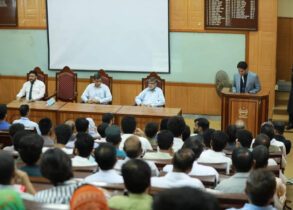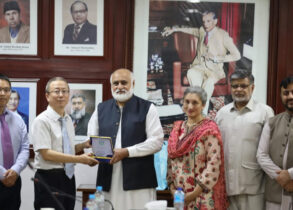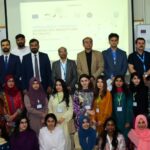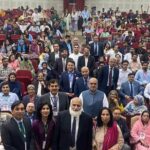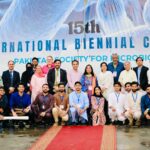Genetics in Islam and Modern Concerns
Exploring the Ethical and Legal Dimensions of Genetics within the Islam
A seminar titled “Exploring into the ethical and legal dimensions of genetics within Islam” was recently organized by the Department of Zoology, Quaid-i-Azam University (QAU) Islamabad. The distinguished guest speaker for this event was Molana Muhammad Faeq (Islamic Scientist), an accomplished scholar renowned for his expertise in Islamic Jurisprudence with the deep understanding on Shari’ah compliance of the modern issues.
The seminar addressed five interconnected topics that encompassed genetics in Islam. The first topic focused on “The Sources of Genetics in Islam” followed by “The Value of Scientific Research from a Shari’ah Perspective.” The third topic examined “Inter-Family Marriages,” while the fourth discussed the “Status of Abortion in Cases of Genetic Disorders.” Lastly, the seminar explored the “Problems Evolving Genetics & Modern Issues.” It emphasized the significance of aligning genetic research and practices with Islamic teachings due to the vital role genetics will play in the future. Geneticists, as Muslims, must adhere to Shariah-compliant modes in their work, research, and teaching methods.
Notably, prominent geneticists such as Spallanzani, N.M. Stevens, Jacobs, and others discovered concepts after the 17th century that were already guided by the Quran and Hadith. While the Quran is not a scientific book, its miraculous nature becomes evident when its teachings align with scientific discoveries. Hadith of the Bedouin explicitly addresses the concept of filial generation and the inheritance of traits. Additionally, 1400 years ago, the Holy Prophet Muhammad (SAW) introduced the idea of recessive traits, demonstrating the wisdom of Islamic teachings.
The taboo surrounding inter-family marriages was also discussed, as some argue that Islam opposes such opinions. However, the quote from Umar (R.A) stating, “Do not marry close relatives, for verily your child will be born weak,” was specific to a particular clan. It is worth noting that the Holy Prophet Muhammad (SAW) himself married his first cousin, Zaynab bint Jahsh (R.A), who was the daughter of his paternal aunt. Furthermore, the Holy Prophet’s (SAW) daughter, Fatima (R.A), was married to Hadhrat Ali (R.A), who was his first cousin. On the other hand, if there are genetic disorders within a family, marrying outside the family can be considered to mitigate potential risks of disease transmission.
The seminar also delved into genetic disorders and abortion, discussing the different stages of abortion in relation to the severity of the disorders, along with corresponding Islamic legal opinions (Fatwa).
In conclusion, the seminar shed light on the interconnectedness of genetics and Islam, urging geneticists to align their work with Islamic teachings. It highlighted the guidance provided by the Quran and Hadith on genetic concepts and addressed misconceptions regarding inter-family marriages. The speaker also tackled the ethical considerations surrounding genetic disorders and abortion, providing Islamic legal perspectives on the matter. A large number of students and faculty members attended the seminar.
 PM’s Laptop Scheme’s Provisional List has been shared with Department Focal Person. Check your status, please
PM’s Laptop Scheme’s Provisional List has been shared with Department Focal Person. Check your status, please


